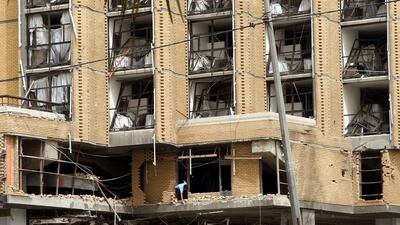BAGHDAD // Fifteen people were killed and 42 injured in bombings at two prominent Baghdad hotels that were claimed by ISIL.
Officials warning of more attacks as government forces carry out operations to drive ISIL out of neighbouring provinces.
The double bombing occurred late on Thursday when the bombs went off in the car parks of the Cristal, formerly Sheraton, and Babil hotels. Initial reports said 10 people were killed and 27 wounded, but the casualty figures rose overnight.
ISIL – which has overrun swathes of territory north and west of Baghdad since June last year – claimed the bombings in an online statement, saying one car bomb was left at the Ishtar while the Babil blast was a suicide attack.
The two explosions shattered windows of the recently renovated hotels and destroyed several cars. Baghdad’s top hotels are usually crowded on Thursday nights.
Police said another car bomb found near the Babil Hotel was defused early on Friday.
The attacks on heavily secured buildings in the heart of Baghdad demonstrate the boldness and freedom with which militants have been able to operate in the capital.
A police officer blamed the infiltration on the negligence of the hotel guards and the weak security measures adopted by police in Baghdad.
Sameer Al Shwaili, a spokesman for the government’s anti-terrorism apparatus, said more attacks on Baghdad were expected as military operations continue in an effort to drive out ISIL militants from the Sunni-majority provinces of Anbar and Salahuddin.
“The situation is directly related to operations in Anbar, and operations in Tikrit,” Mr Al Shwaili said.
“Car bombs and bombs are typically used by Daesh in a way to create fear among the citizens of Iraq,” he said, using the Arabic acronym for ISIL.
Government troops and allied, mostly Shiite, militas continue to close in on Ramadi, the capital of Anbar province, which ISIL captured on May 17, but an offensive to wrest back the city has not begun in earnest.
Fighting also continued in several parts of Salahuddin province, where government forces – backed by the militias and airstrikes from the US-led coalition – took back the city of Tikrit from ISIL this year.
Muwaffak Al Rubaie, a former national security adviser, said the attacks on the Baghdad hotels showed that ISIL, which mainly attacks security forces and Shiite mosques, was changing tactics and selecting new targets frequented by the middle and upper classes.
“I think ISIL is developing new techniques for getting through the mirrors, the physical searches, and even the canine searches,” said Mr Al Rubaie, a member of parliament.
Baghdad-based security expert Muataz Muhei said that Baghdad police officers and hotel security guards often lacked the expertise needed to deal with the kind of security challenges presented by ISIL.
“Daesh chose those well-protected sites to display to the public that they are still able to hit hard targets,” Mr Muhei said.
Yesterday, a roadside bomb hit a commuter bus in eastern Baghdad, killing three passengers and wounding 10 others.
Meanwhile, the United Nations said yesterday that about 85,000 people had fled Ramadi since ISIL captured the city, warning that Iraqi authorities were blocking many of the displaced from reaching safety.
William Spindler, spokesman for the UN refugee agency, said that restrictions placed on people fleeing the fighting by Iraqi authorities were forcing many to remain in conflict areas.
* Associated Press with additional reporting from Agence France-Presse

